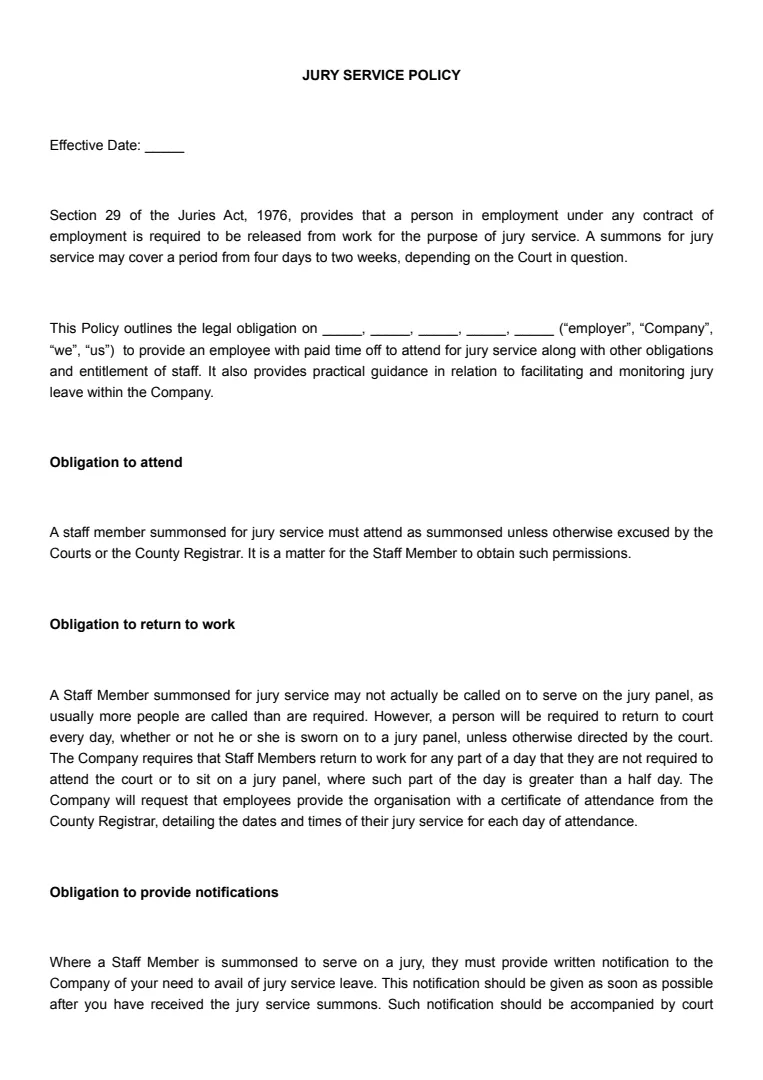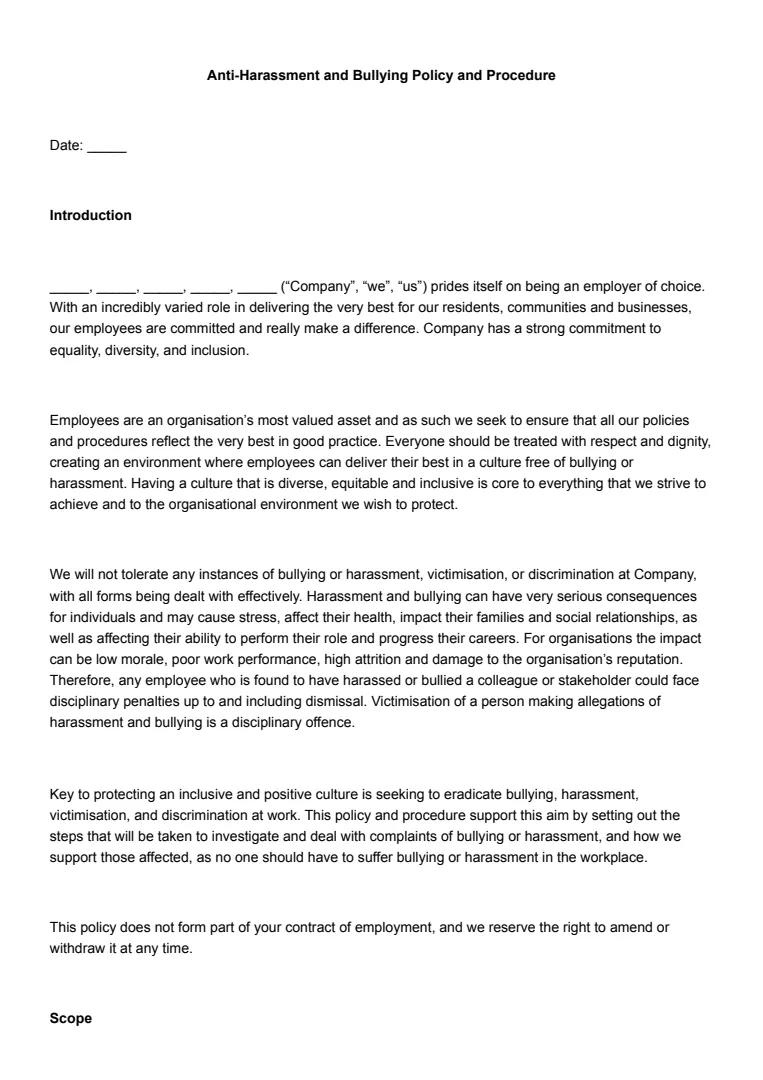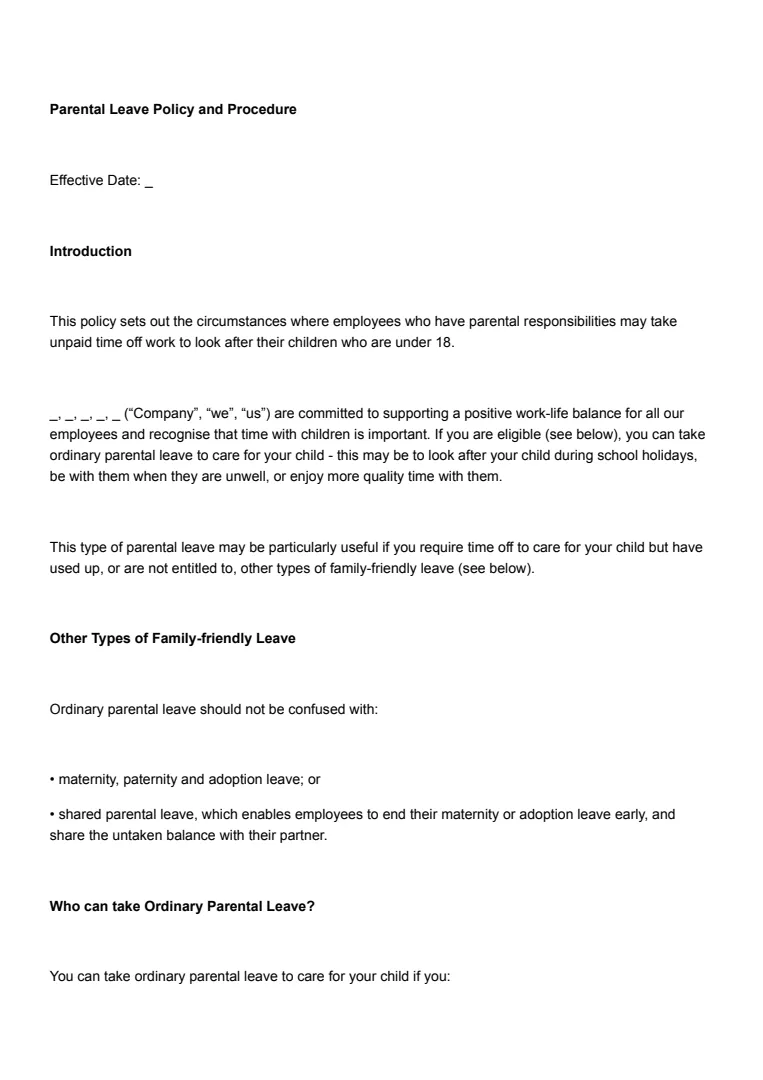What Is a Time Off for Dependants Policy?
What is dependant leave, and is there a policy for it? This is when an employee takes short-term emergency leave in a circumstance where a dependant requires immediate attention. A time off for dependants UK policy is a written document that explains employees’ legal entitlement to take time off for this purpose. Under UK law, this leave is generally unpaid, but employers may enhance the benefit by offering pay or additional support.
A dependant can include a spouse, partner, child, parent, or another individual living in the household who relies on the employee for care. In some cases, it may extend to people outside the household if they reasonably rely on the employee, such as an elderly relative or vulnerable neighbour.
The policy ensures that managers apply the entitlement consistently and fairly across the workforce. It also gives employees reassurance that they will not be penalised for meeting their legal or family obligations in unexpected circumstances.
When Should You Use a Time Off for Dependants Policy?
Employers should introduce a time off for dependants policy to reduce disputes, clarify statutory rights, and create a transparent framework for emergency leave. It is especially useful in businesses where flexible working and family support are valued.
The policy applies in any situation where an employee needs to respond to urgent and unforeseen events involving a dependent. This prevents situations where managers must decide on a case-by-case basis without guidance, which could lead to inconsistent treatment.
By adopting a clear written policy, employers ensure both compliance with legislation and improved employee relations. Staff understand the process, while managers can handle requests quickly and fairly.
1. Emergency Illness or Injury
When a dependant suddenly becomes ill or is injured, employees are legally entitled to take reasonable time off to manage the immediate emergency. This could include rushing a child to hospital, arranging urgent treatment for an elderly parent, or being present during an accident involving a partner. The key factor is immediacy; the law recognises that in emergencies, employees cannot always schedule time off in advance.
Employers should clarify in the policy that this entitlement covers unforeseen health issues requiring immediate attention, not routine medical check-ups or planned appointments. A best practice is to specify that if the event requires emergency services, hospital admission, or urgent supervision, it qualifies under this policy. By drawing this line, employers protect business operations while safeguarding staff in genuine crises.
Expert Tip:
“Clearly state in your policy that routine medical appointments do not qualify as dependency leave. Many disputes arise when employees assume regular check-ups are covered. Defining ‘emergency’ prevents misuse and keeps policies focused on urgent, unforeseen needs.”
2. Breakdown in Care Arrangements
Dependants often rely on regular care structures such as nurseries, schools, childminders, or professional carers. If those arrangements collapse without notice, employees may suddenly need to step in. Common examples include a nursery closing because of staff illness, a childminder cancelling, or a live-in carer for an elderly relative being unavailable. In these cases, time off is essential to arrange alternative care, even if only for a short period.
Policies should clearly state that this type of leave is not intended for predictable changes, such as scheduled holidays for a caregiver, but only for last-minute breakdowns that leave dependants unsupported. To add value, employers can include guidance on what constitutes “reasonable time” for arranging alternatives, often one or two days. This helps employees plan effectively while maintaining operational stability.
Expert Tip:
“Set guidance on what ‘reasonable time' means for arranging new care. For example, one or two days may be sufficient for most cases. This avoids ambiguity while giving employees the flexibility to address urgent gaps in childcare or eldercare.”
3. Death or Funeral Planning
The sudden death of a dependant creates both emotional and practical pressures that require immediate attention. Dependency leave often applies in the days following a death when employees need to arrange funerals, handle urgent legal paperwork, or support vulnerable family members. These responsibilities typically cannot be delayed and may overlap with compassionate or bereavement leave policies.
Employers should use the policy to distinguish between emergency dependency leave, which covers urgent tasks immediately following a death, and compassionate leave, which typically covers a longer recovery or mourning period. Providing clarity here reduces confusion and ensures staff know what type of leave to request. Employers may also wish to acknowledge cultural or religious practices around funerals, demonstrating sensitivity and inclusivity in the policy.
4. School or Care Emergencies
Schools and care facilities are key environments where dependants spend much of their time, and unexpected incidents there may require urgent parental or guardian involvement. Examples include a child being excluded from school due to behavioural issues, a safeguarding concern requiring immediate attendance, or a care home calling about a serious situation with an elderly relative.
These events can be highly stressful, and employees should feel secure in knowing their right to leave covers such circumstances. A well-written policy should explicitly reference these scenarios, preventing disputes over whether they qualify.
Employers can also advise staff to inform managers as quickly as possible and, where appropriate, provide supporting evidence such as a letter from the school or care home. This creates fairness while reinforcing trust between employer and employee.
How to Write a Time Off for Dependants Policy
Writing a policy requires a careful balance between statutory rights and business operations. Employers should aim for clarity, fairness, and legal compliance, while also making processes straightforward for managers and staff.
This is where Legally.io, a policy generator, can help. It creates tailored documents that ensure compliance with UK law, save time, and reduce the risk of errors.
Step 1: Define Dependants Clearly
The foundation of a time off for dependants policy is clarifying who qualifies as a dependant. UK employment law defines a dependant broadly to include spouses, civil partners, children, and parents, but it also extends to anyone living in the household or someone who reasonably relies on the employee for care.
Employers should not just copy the legal text; adding everyday examples, such as a sick child needing immediate medical attention or an elderly relative who depends on daily support, makes the policy more understandable. Clearly setting these boundaries avoids disputes and ensures both managers and employees know when the entitlement applies.
Step 2: List Covered Emergencies
Ambiguity often arises around what counts as an “emergency.” To avoid this, policies should provide a detailed, non-exhaustive list of scenarios that qualify. These may include sudden illness, a dependant’s accident, the collapse of childcare arrangements, the unexpected death of a dependant, or urgent incidents at school or a care facility.
While the list should not be restrictive, giving examples helps employees understand the intent of the law; it’s about dealing with immediate, unforeseen crises rather than routine responsibilities. This approach protects against misuse while still being flexible enough to cover genuine emergencies.
Step 3: Outline Notification Process
Emergencies rarely allow for much planning, but employees should still be expected to notify their employer as quickly as possible. A good policy will outline multiple methods of communication, such as a phone call, email, or message to a line manager, to account for the urgency of the situation.
Employers may also want to specify that written confirmation should follow once the emergency has stabilised. Setting expectations about the information to be provided (for example, who the dependant is, the nature of the emergency, and the likely duration of absence) helps managers plan for cover and demonstrates fairness in how leave is granted.
Expert Tip:
“Require employees to notify their manager as soon as possible and provide written confirmation after the emergency. A clear process ensures fairness, prevents misunderstandings, and gives managers the information needed to plan work cover.”
Step 4: Clarify Pay Arrangements
By law, dependency leave in the UK is unpaid, but organisations may choose to enhance this entitlement as part of their benefits package. Some employers offer limited paid days per year to demonstrate support for working parents and carers. Others allow staff to use annual leave if they wish to be paid during their absence.
Whatever the approach, it is critical that the policy is clear, so employees do not assume entitlement to pay where none exists. Clarity around pay avoids disputes, supports financial planning for employees, and ensures fairness across the workforce.
Step 5: Reference Legal Framework
Every policy should anchor itself in the legislation that creates the entitlement. Section 57A of the Employment Rights Act 1996 is the key provision, and citing it reassures employees that the policy is not just an internal guideline but a reflection of their statutory rights.
Employers can also use this section to highlight that employees are legally protected from dismissal or detrimental treatment for taking dependency leave. Including these references adds weight to the policy, signals compliance, and ensures both managers and employees understand the legal backdrop.
What Should a Time Off for Dependants Policy Contain?
A strong policy should include the following core elements:
- Purpose and Scope – Explain why the policy exists, which employees it applies to, and its alignment with UK employment law.
- Eligibility – Define who qualifies as a dependant and outline whether the policy applies equally to all employees, regardless of length of service or contract type.
- Circumstances Covered – Provide specific examples of emergencies that qualify, ensuring clarity for both staff and managers.
- Notification Process – Set out how employees must report their absence, to whom, and within what timeframe.
- Pay and Duration – Clarify whether the leave is unpaid, whether pay enhancements apply, and how long a “reasonable” period of leave typically lasts.
- Interaction With Other Leave Policies – Explain how dependency leave differs from compassionate leave, parental leave, or annual leave. This avoids overlap or double entitlement.
- Confidentiality and Non-Retaliation – Confirm that employees will not be penalised for taking statutory leave and that requests will be handled confidentially.
Legal Tips for Writing a Time Off for Dependants Policy
- Reference Legislation Clearly: Always cite the Employment Rights Act 1996 so the policy is anchored in law. This avoids ambiguity and gives both parties confidence in its enforceability.
- Clarify “Reasonable Time”: The law leaves “reasonable time” undefined. Employers should set expectations by stating what they typically consider reasonable, while retaining flexibility to deal with exceptional cases.
- Avoid Overlap With Other Policies: Be clear about how dependency leave differs from other forms of leave. This helps prevent double claims and provides transparency to staff.
- Provide Guidance for Managers: Train managers to handle requests consistently. A well-drafted policy is only effective if it is applied fairly in practice.
- Consider Enhancements: Employers who choose to offer paid dependency leave may see improvements in staff morale, retention, and loyalty. Enhancements beyond statutory requirements demonstrate support for employees with caring responsibilities.
Expert Tip:
“Consider offering a small number of paid dependency leave days as an enhanced benefit. While not legally required, this demonstrates support for staff with caring responsibilities and can improve retention, loyalty, and overall workplace morale.”
Key Takeaways
A time off for dependants policy is essential for clarifying employees’ rights to unpaid emergency leave under UK law.
It ensures compliance with the Employment Rights Act 1996, sets expectations for staff, and creates consistent processes for employers.
By defining eligibility, listing covered emergencies, and establishing clear procedures, businesses can reduce disputes and build trust with employees.
Using platforms such as Legally.io to draft and manage these policies helps organisations save time, avoid mistakes, and remain legally compliant.













